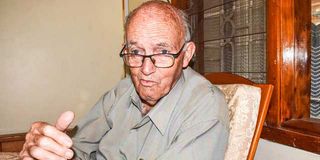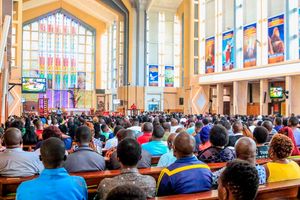
Fr Gerald Kraakman during an interview at Mill Hill Missionary House in Kisumu. The 83 year old priest is heading back to the Netherlands after 55 years of service in Kenya.
Wednesday, July 2, 2025, marked the end of an era as Fr Gerald Kraakman, a Dutch priest of the Mill Hill Missionary Congregation, concluded his service in Africa.
For more than five decades, Kenya became a second home to the clergyman who dedicated his life to spiritual service, pastoral care and social development among the people of Nyanza.
Now 83, Fr Kraakman will return to his native Netherlands after retiring from active ministry. He celebrated his final mass on Sunday, June 29, at St Peter’s Nanga Parish in Dunga, Kisumu County, an emotional farewell to a flock he has served with devotion.
The only white Mill Hill priest in the Archdiocese of Kisumu, Fr Kraakman leaves behind a legacy steeped in evangelisation, cultural integration and charitable works.
Renowned for his fluency in Dholuo, he earned deep respect among the communities he served, so much so that the Yimbo people of Siaya County affectionately nicknamed him “Fr Orako,” a local adaptation of his surname.
His journey in Kenya began in November 1968 when fresh from his ordination at the age of 27, he was posted to Bar Korwa Parish in Seme Sub-county.
“I arrived in Kenya at the time when Bishop Zacchaeus Okoth was being ordained a priest. The parish priest then was Fr John Van Auderaar and I was to stand in for the assistant priest who had gone on holiday,” he recalls.
In Seme, he began learning Dholuo, initially from children who after returning from school would sit with him and teach him the language.
Mastery came with time, but he eventually became proficient enough to not only celebrate Mass in Dholuo but also deliver sermons that deeply resonated with his congregants.
After six months, when the Bar Korwa assistant returned, Fr Kraakman was reassigned to Nyangoma Church in Siaya and later to Nyamonye Parish, where he served for two decades.
There, his ministry extended beyond the pulpit as he spearheaded the construction of a church, schools, hospitals and homes for widows.
The coordinator of Nyamonye Catholic Parish, Mr Charles Obiero, remembers Fr Kraakman’s arrival as a turning point for residents.
“He came at a time when traditional African religion was widespread, but through his tireless efforts, many were drawn to Catholicism. He built not only the church but also hospitals, a dispensary, a polytechnic and a convent,” said Mr Obiero.
Fr Kraakman’s missionary journey led him to also serve in Nyawita, Kisumu. While stationed there, he frequently celebrated Mass in Dholuo, affirming his deep connection to the people. He integrated seamlessly into local life.
“I practically ate everything, but I particularly loved tilapia. I never really took to omena though,” he says.
While several white missionaries in the 19th and 20th centuries succumbed to tropical diseases such as malaria, Fr Kraakman credits ginger water for his strong immunity.
“In the early years, malaria was a serious threat but over time, I found that consuming ginger water helped me resist it. Even during the Covid-19 pandemic, I contracted the virus once and was fortunate to recover,” he recalls.
As he prepares to return to Europe, Fr Kraakman confronts a sobering truth: the waning of religious fervour among the youth in the Western world.
“In Holland, there is a dire shortage of priests. Very few young people are responding to the call to priesthood. Most of our seminaries in places like Ireland have shut down and ironically, we may one day have to rely on African missionaries to re-evangelise the West,” he observes.
Born into a family of nine children, Fr Kraakman credits his upbringing with nurturing his spiritual path. His family lived near a church and daily attendance was part of his youth. One unforgettable moment marked the beginning of his vocation.
“One day, as I was walking out of church, I heard a voice say, ‘I want you to be a priest’. I turned around, but no one was there. I believe with certainty that it was the Lord speaking to me. That moment defined my calling,” he recounts. “Those who aspire to priesthood must listen for God’s voice. It is he who calls—we do not call ourselves.”
Fr Kraakman will be accompanied back to the Netherlands by his niece Ingrid Smit who shared her own emotional reflections.
“This is my first time in Kenya and I am moved beyond words. It is incredible how much people appreciate my uncle’s work and how deeply he has touched their lives. Although he is leaving, I know his heart remains in Africa as deep down, he had always hoped to live and die as a missionary on this continent,” she says.





